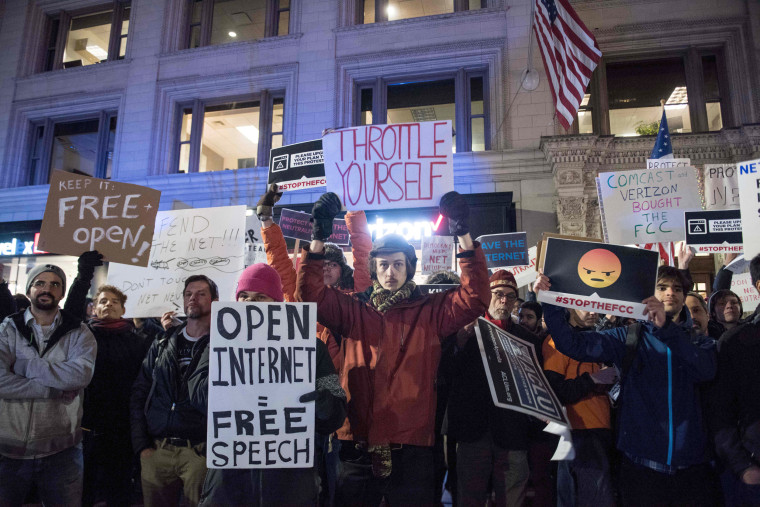After years of playing what internet service providers have likened to "regulatory ping pong" with net neutrality rules, the game is still far from finished.
The attorneys general of New York and Washington state have already announced they plan to sue. However, it's likely that Congress may hold the key to ending the expensive and time-consuming back-and-forth over net neutrality.
"That is the only way you are going to have sustainable net neutrality," Roslyn Layton, a visiting scholar at the American Enterprise Institute, told NBC News.
"For a long time, the major internet service providers have wanted to make a law. It is expensive for them to fight this in court all the time," said Layton. "They’ll say, 'We’ll adopt the rules [no blocking, fast and slow lanes and paid prioritization],' but they don't want to be regulated [as a utility.]"
Since 2015, net neutrality rules have required internet service providers to be regulated under Title II, like a utility, helping to control what consumers are charged and ensuring all traffic is treated equally.
The 3-2 vote on Thursday means that ISPs will now return to being classified as a Title I information service, giving them more leeway to create new packages and to create so-called internet "fast and slow lanes," as long as they publicly disclose their practices.
Related: The FCC just scrapped rules regulating equal access to the internet
While the FCC killed net neutrality, those changes won't take effect just yet. The new rules will be submitted to the Office of Management and Budget and then published in the Federal Register, the government's public journal detailing new rules.
The return to a "light-touch" approach has long been anticipated by internet service providers, many of whom have aggressively lobbied for the change. With a new administration and a Republican majority on the FCC, it seemed all but inevitable the Obama-era rules would be deleted.
When could your internet plan change?
One day after the vote, the world is still turning and the internet is still functioning as usual. However, it's possible consumers could see changes as early as next year.
"Part of the dynamism of our internet is the ability to try different business models... at the end of the day, the consumer should be able to decide what she wants to see and what she wants to pay," said Layton. "What I would hope to see is a decrease in price and an expansion of the types of offers they have available today."
While the ramifications won't be immediately felt, Commissioner Jessica Rosenworcel, who voted against gutting net neutrality, warned there could be long-term consequences.
"What this proposal would do is it would give broadband providers the legal right and the power to start blocking websites, or censoring content if they don't have a commercial relationship with that content. And so the open internet as we know it could change," she told NBC News before the vote. "Perhaps not immediately, but over time. And I think that's troubling."
Is Congressional action a possibility?
That's where Congress could find some semblance of a happy medium between the internet service providers and net neutrality proponents.
More than 100 House Republicans signed a letter to FCC Chairman Ajit Pai on Wednesday, expressing their support for the vote and a desire to take action in Congress.
"After broadband is restored to its rightful regulatory home, under the light-touch approach that guided federal oversight of the internet and nurtured its expansive growth for decades, the stage will be set for Congress to determine how best to enact permanent protections for the bipartisan net neutrality principles on which we all agree," the letter said.
Senate Minority Leader Chuck Schumer, D-New York, on Friday said he supports a Congressional Review Act resolution that will be introduced that would undo the FCC's decision.
Elizabeth Bowles, president and chairwoman of Aristotle, a wireless broadband provider in Arkansas with approximately 800 customers, told NBC News last month she supported the rollback of net neutrality rules because it would end a lot of the expensive regulatory burden put on her small company. However, she said she wants Congress to take action to protect the "bright line rules," which include no blocking, throttling or paid prioritization.
Many internet service providers, including Comcast, the parent company of NBC News, have said they will not block, throttle or engage in paid prioritization. However, with the latest FCC action, there's nothing actually preventing them from engaging in those practices, as long as they disclose them.
Comcast supported the end of the 2015 net neutrality rules but has also been calling on Congress for the past seven years to pass bipartisan legislation and to "end the cycle of regulatory ping pong we’ve been trapped in for over a decade and put this issue to rest once and for all," according to a company statement.
Without Congressional action, the tug-of-war over net neutrality rules will likely continue whenever a new party comes to power, leading to many more costly court battles.
"This isn’t over and done with," said Layton. "And there is no doubt if the Democrats took the presidency, they would try to go back to where things were in 2015."
